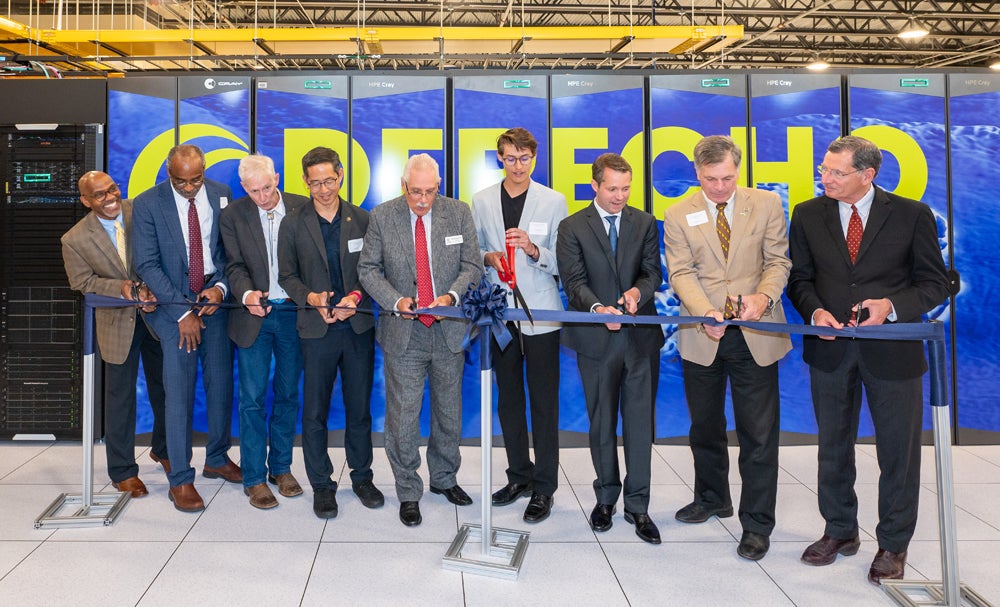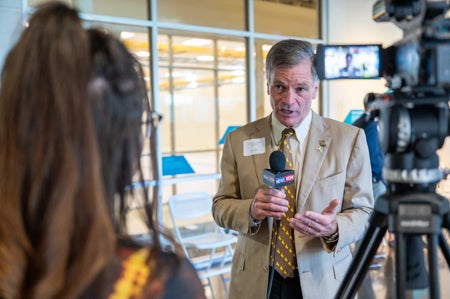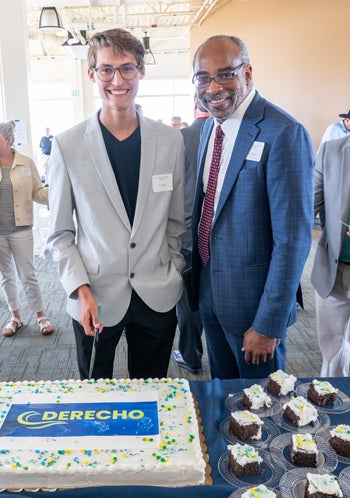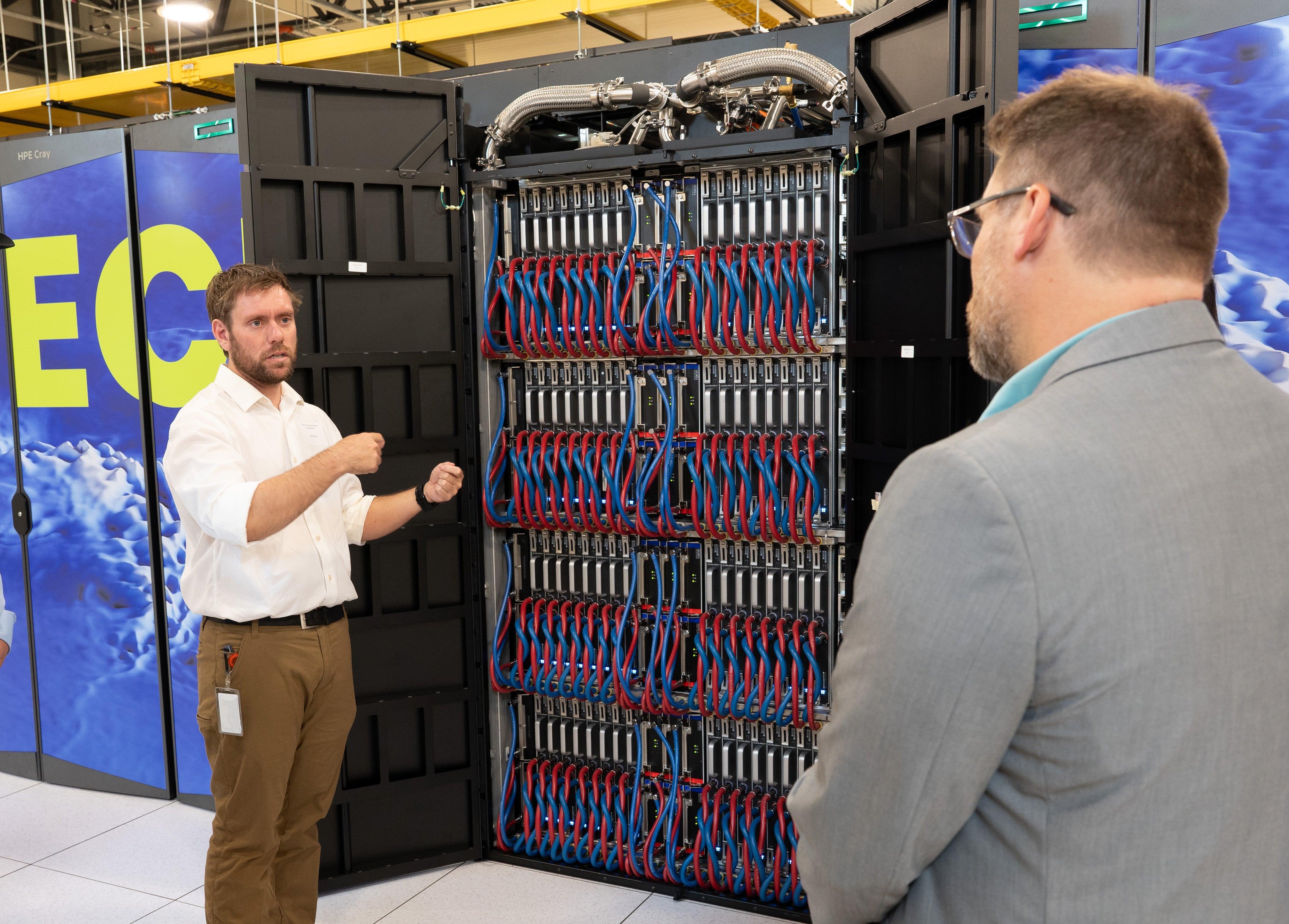Officials inaugurate new NWSC supercomputer
The Derecho supercomputer provides major new capabilities to scientists nationwide
Aug 21, 2023 - by David Hosansky
Aug 21, 2023 - by David Hosansky

Officials inaugurate the new Derecho supercomputer with a ceremonial ribbon cutting. From left: Bernard Grant, acting section head of the National Science Foundation Division of Atmospheric and Geospace Sciences; NCAR Director Everette Joseph; University of Wyoming President Edward Seidel; Kei Koizumi, Principal Deputy Director for Policy of the White House Office of Science and Technology Policy; UCAR President Antonio Busalacchi; Wyoming high school student Cael Arbogast: Justin Hotard, Executive Vice President and General Manager, HPC, AI & Labs, HPE; Wyoming Governor Mark Gordon; and U.S. Senator John Barrasso of Wyoming.
CHEYENNE, Wyoming — Political, science, academic, and business leaders formally inaugurated a new supercomputer today at the NCAR-Wyoming Supercomputing Center (NWSC). “Derecho” will provide researchers across the country with an important new tool to advance understanding of the atmosphere and other Earth system processes.
Among the dignitaries who participated in today’s formal ribbon cutting were Wyoming Governor Mark Gordon; Wyoming Senator John Barrasso; the heads of the University Corporation for Atmospheric Research (UCAR), National Center for Atmospheric Research (NCAR), and University of Wyoming; and top officials with the U.S. National Science Foundation (NSF), the White House Office of Science and Technology Policy, and Hewlett Packard Enterprise (HPE).

Derecho is a 19.87-petaflops system, meaning it has the theoretical ability to perform 19.87 quadrillion calculations per second. That is about 3.5 times the speed of scientific computing performed by the previous NWSC supercomputer, Cheyenne, and represents the equivalent of every person on the planet solving one calculation every second for a month.
Derecho is also the first NWSC supercomputer to include a significant number of graphics processing units (GPUs), with 382 NVIDIA A100 GPUs providing 20% of its sustained computing capability. GPUs are more effective for newly developed artificial intelligence and machine learning techniques because they perform large numbers of computations simultaneously on one accelerator, resultig in lower power usage and less hardware for the same number of parallel operations.
Funding for the new system, which cost about $35 million, was provided by NSF, NCAR’s sponsor. The NWSC is funded by NSF and by the state of Wyoming through an appropriation to the University of Wyoming. Additional partners include Cheyenne LEADS, the Wyoming Business Council, Black Hills Energy, and UCAR, which manages NCAR on behalf of NSF.
Derecho was built by HPE. It was installed earlier this year at the NWSC, where it underwent months of testing.
The new supercomputer is so energy efficient that it will use only about 40% more electricity than Cheyenne – which is itself highly energy efficient – despite being 3.5 times faster. This is partly because GPUs deliver up to six times the performance (as measured by floating-point operations) per watt of energy than CPUs.

High-performance computers such as Derecho enable researchers to run increasingly detailed models that simulate complex processes and how they might unfold in the future. Scientists can also harness the increased computing power to run multiple simulations that provide a more complete picture of the Earth system. This type of ensemble modeling enables them to quantify the range of likely outcomes, or uncertainty, of a given event.
Ensemble predictions are particularly helpful for providing resource managers and policy experts with valuable information for planning ahead and mitigating risk.
Scientists across the country are starting to use Derecho to study phenomena ranging from wildfires and hurricanes to solar storms. Their findings will help better protect society from environmental disasters, lead to more reliable projections of long-term weather patterns, and improve weather and climate predictions that are needed by vulnerable communities and critical sectors of the economy such as agriculture and transportation.
“This type of environmental intelligence is critical to farmers, ranchers, energy producers, shipping companies and, in essence, every single sector of our economy,” said UCAR President Antonio Busalacchi. "Scientists are also using Derecho to better understand extreme weather and other events that threaten many of our communities."
“We’re really starting to use the research to answer fundamental questions about the world around us and advance what we call ‘actual science,'” said NCAR Director Everette Joseph. “We’re providing decision-makers with actual information to protect local communities with these events that we’re experiencing.”
